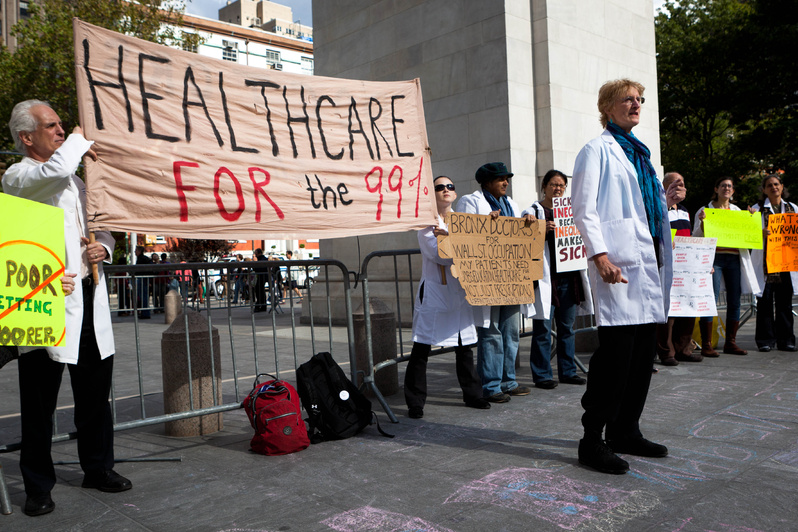NEW YORK — They were out to change the world, overthrow the establishment and liberate the poor. But first somebody would have to do something about those bongo drums.
At the Occupy Wall Street protest camp in Manhattan, protesters agonized over what to do about drum players who had turned part of the site into an impromptu dance floor. The neighbors were complaining about the racket. The protesters had tried to put a time limit on the noise, but the drummers were refusing to obey.
“It’s an issue, definitely,” sighed protester Kanene Holder, 31, on Friday night. “We’ll have to work it out.”
Reining in a few pesky percussionists would seem to be an easy task for a movement seemingly on the verge of becoming a political force. But one month after it burst onto the scene, the Occupy Wall Street protest remains stubbornly decentralized, complicating everything from enforcing camp rules to writing a national platform.
While the message against corporate greed has struck a nerve with many Americans, the lack of leaders in Manhattan and at other protest camps has baffled many.
In Minneapolis, Hennepin County Sheriff Rich Stanek has been meeting every morning with a delegation of protesters – “at least, the ones who come forward and say they are the organizers,” Stanek said. “It’s a little difficult because it seems like each day it’s been a completely different group of folks.”
Protesters say the decentralization is deliberate and note that other movements, like the 1960s civil rights effort, began in a similarly disorganized way.
And some academics who have studied dissent movements say that while being “leaderless” has some drawbacks, it could also have great advantages. It has allowed people with different backgrounds – like union workers and anarchists – to rally behind the same broad message against corporate greed, without actually agreeing much on where the country should go from here. From its earliest days, the people at the heart of Occupy Wall Street have worked hard to make it a movement without leaders.
Instead, decisions at the camp in lower Manhattan’s Zuccotti Park are made at a General Assembly of protesters that sometimes numbers in the thousands, while the nitty-gritty work of organizing the encampment is carried out by a large number of autonomous work teams that largely function without central oversight.
The General Assembly had already decided during Thursday’s night’s meeting to limit drum playing, but to no avail. On Friday, a smaller group of drummers and mediators later agreed to limit the music to noon to 2 p.m. and 5 to 7 p.m., said Andrew Smith, 26, of Portland, Ore., who sat in on the negotiations.
In other areas, though, the independent nature of the work teams has allowed them to act efficiently and quickly.
From its first days, the protesters have had an aggressive media outreach program. The finance committee worked out an agreement with a nonprofit group in Washington, D.C., that has begun allowing the movement to accept credit card donations online.
The commitment to consensus on big issues has prevented the group from settling upon a single list of demands to present to the public, protesters say. But they insist that’s OK.
“When the civil rights movement started, people didn’t come out right out with a big list of demands – they came out in the streets and just said, ‘We’re not going to accept society the way it is,’ ” said Ed Needham, 43, a public relations manager from Cambridge, Mass. “That’s the stage we’re in right now.”
A sign near the edge of the protest camp Friday echoed that sentiment: “We’re here, we’re unclear, get used to it!”
The bigger hurdle for the Occupy movement may not be the lack of strong leaders but the large philosophical differences between the small group of demonstrators and the much larger – but less radical – group of outsiders who have been supportive of the protests from afar, said Gitlin.
The young people at Zuccotti Park “really think they are headed for no future. No jobs. Ice caps are melting. Misery in the offing … You want a new civilization,” Gitlin said.
“But most of the people who support you … they don’t want a new civilization. They want to be middle class.”
Send questions/comments to the editors.



Comments are no longer available on this story